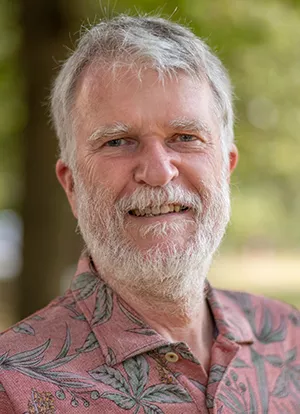Q&A with Cornell Visiting Professor of Chemistry Koop Lammertsma

Organic chemist Koop Lammertsma is internationally recognized in his field. He recently moved from Amsterdam to the U.S. to spend a year teaching at Swarthmore. He will be offering Physical Organic Chemistry, co-taught with Professor of Chemistry Paul Rablen, during the Fall 2022 semester and Green and Sustainable Chemistry in Spring 2023.
Lammertsma started teaching in 1983 at the University of Alabama and remained there for 13 years. During that time, he also served as a program officer for the National Science Foundation in Washington, D.C. In 1996, he took a position as professor and head of organic chemistry at the Vrije Universiteit Amsterdam, where he remained until 2016. Since then, he has been a distinguished visiting professor at the University of Johannesburg, South Africa.
Lammertsma has also conducted scientific research in Japan, India, Italy, and Germany. He has over 250 peer-reviewed publications in the fields of physical and computational organic and inorganic chemistry. Recently, he has developed an interest in environmental and resource conservation issues. His “green chemistry” interests include the coming phosphorus shortage, how to make industrial chemical processes environmentally benign, and how to minimize the depletion of limited natural resources.
We caught up with him in the midst of his international move to find out what most excites him about Swarthmore.
What brings you to Swarthmore?
Paul Rablen was instrumental in getting me to Swarthmore. As physical organic chemists, we have met some seven or eight times over the years at specialized international conferences such as ISRIUM (International Symposium of Reactive Intermediates and Unusual Molecules). At these meetings, he spoke highly of Swarthmore and educated me of the quality of the College and its students and supported this with his well-received presentations. It triggered my interest. As a result, I started to much appreciate the attitude, performance, and dynamics of the College.
When Paul approached me in Ascona, Italy, in 2018 at the ISRIUM conference about whether I would be interested in spending a year at Swarthmore College, I was immediately in favor. Becoming an examiner for his class and examining some brilliant honor students only added to my enthusiasm. Sadly, COVID-19 made the visit impossible, but fortunately this could be rescheduled to the current academic year. Meanwhile, I participated in some of his class sessions during COVID-19 for fun and to stay in contact.
What are your expectations?
My interest is to support Paul, and thus the seniors at Swarthmore College, to further the education of physical organic chemistry, which is the toolbox for (in)organic chemistry. When students master this class, they typically do very well in whatever (bio)chemistry field they choose for graduate studies and beyond. The toolbox is continuously updated, and it is exciting to participate in that.
My other and more pressing interest is to bring about or to strengthen the insight of young students in sustainability by using a chemical perspective. Issues like global heating due to emission of carbon dioxide and methane, the impact of overusing nitrogen resources and depleting phosphorus resources (both as fertilizers), and the consequences of the diminishing availability of rare earth metals on the digital world as well as on the solar and wind energy are topics that the next generation has to deal with. My motivation is to instill an awareness.
My expectations are that I will interact with highly motivated and capable students, both in their first year in the sustainability class as well as those in their final year in the physical organic chemistry class. This is truly an exciting undertaking, and I feel privileged to be involved.
Outside of the classroom, what are you hoping to accomplish here?
Having lived for some 15 years in the U.S. (in California, Alabama, and Washington, D.C.), it is great to be back after some 25 years. Having been mostly involved in graduate programs, I am much looking forward to being part of an undergraduate program, and Swarthmore College is amongst the best one could wish for. I hope to interact not only with many of the faculty members, but also get a feel for the community during my stay.
One of my children is living in the U.S. and, of course, I am looking forward to visiting him. I am glad with the accommodations at Swarthmore, which enables visits from my wife. It feels so good for both of us to strengthen our American ties.
What else would you like the college community to know about you?
What might be useful is to share not only my academic experience, but also grantsmanship. Currently, I have a funded research group in Johannesburg. Over the years, I have served in many different roles at the Vrije Universiteit Amsterdam, and have been for many years a member of the Chemistry Board of the Dutch national funding agency NWO. I was also a rotator at the National Science Foundation in the early 1990s. I am the 2021 recipient of the International Arbuzovs Prize in Organophosphorus Chemistry, which is the highest distinction in the field.
How do you think your experiences teaching in Alabama, South Africa, and Amsterdam have prepared you for teaching at Swarthmore?
I taught many classes over many years and learned to appreciate the needs of students, irrespective of their diversity. The greatest reward of a teacher is to see a student succeed and to hopefully perform even better than the teacher. To achieve this requires being able to listen to students carefully. The small-sized classes at Swarthmore College provide a perfect setting.



